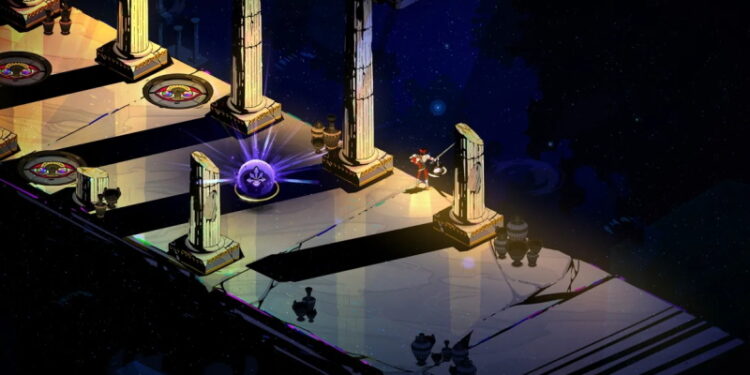Your Dungeon Needs Chaos Gates

Supergiant released a little vidja game called Hades, and folks, it is simply incredible. Yes okay it came out in December of 2018 – I didn’t play it until this year when it came to the Nintendo Switch. (This post isn’t a review, but you can take the BAFTA’s word for it.) It’s a roguelike with procedurally connected rooms. In addition to the ordinary 1-3 ways out of any given room, there are also Chaos Gates and Erebus Gates, and as you might have guessed from the title, today I care about Chaos Gates.
Chaos Gates in Hades
The deal with Chaos Gates is that you’re choosing to pass up on the ordinary reward for clearing the next room, and you have to take some damage (unless you’re using Chaos’s trinket). It’s enough damage to give you pause in the early game, and… less pause later on. Anyway, you go to Chaos (the place) where you talk to Chaos (the creator god), who offers you one of three different banes. If you survive that bane (a duration measured in rooms), you get an associated boon, typically as good as or better than other available boons and, more importantly, stacking with other percentage adds.
Anyway, what’s interesting here:
- A door that’s only sometimes there, creating an alternate path through the dungeon.
- A serious drawback that pays off with a lasting advantage, if you survive long enough to enjoy it.
- Those drawbacks seem to alter the reality of the world ahead of you, such as spawning more monsters or clouding your perceptions of upcoming room rewards.
- Talking to Chaos is interesting, and you need to talk to them to complete some quests (“Fated List of Minor Prophecies”).
- Playing through the content just to see all of the – fully voiced – dialogue is a huge part of the game’s draw for me.
Of course, D&D doesn’t handle time in terms of chambers, and 5e doesn’t treat encounters as discrete rules objects (that is, nothing explicitly lasts “until the end of the encounter”) the way 13th Age does. When we discussed this over on Twitter, Colin suggested handling this with a death-save-like system, so I’m going to see what I can do with that.
I’ll be calling them Chaos Gates throughout this text, but I’m assuming that you’re not using the Greek god Chaos in the same way, so you probably don’t call them Chaos Gates in your narration. The fey are an easy story choice here. (It’s drop-dead simple to have the fey do anything that Greek gods would do… which points to why the fey have absorbed dryads, naiads, nereids, satyrs, and so on.) What the heck, let’s make a table of ideas out of it.
dX Source
1 – The Summer Court opens a door to a banquet hall. What will it cost to eat the food and drink the wine there?
2 – The Unseelie Court opens a door. Something of the Wild Hunt has entered the dungeon, but you might find something of worth on the dreadful path it came from.
3 – In a clockwork dungeon, some walls become doors when the clock strikes 13, only to close soon after.
4 – A maintenance crew emerges for routine repairs. Slip into their tunnel before the door closes again and find something incredible – but who knows where you’ll be when you emerge again?
5 – When you’re in a dungeon full of devils, the demons offer you a risky option. Same for the devils, when you’re in a dungeon full of demons, but the devils put it down in writing.
6 – Golden letters appear on the wall, which read “I wish for a doorway.”
7 – A wall of spider webbing too thick to cut through (and too risky to burn) conceals a tunnel. A drider with a grudge might let you into the “backstage” of the dungeon’s construction.
8 – In a place where space and time are a mortal’s gloss on a looming truth, a door that opens on an incomprehensible whim is the rule rather than the exception.
Sometimes, A Door
Part of making this work is about your dungeon’s exploration flow. The whole concept of “a door that is only sometimes there” (an intriguing weirdness) requires players to see that room with the door present and absent. (See Path of Chaos below for an alternative.) Optional side paths are the easy way to get PCs to retrace their steps; circular routes are another. (A full course in the level design lessons of Jennell Jacquays is far beyond the scope of this post, but worth your time.)
You’re likely to have PCs be tentative at first – just one or two of the party going through the door. That’s normal dungeon-crawling behavior, but not ideal here, so signal to them that the doorway may close back up and divide the party for a longer time if they don’t all go in. (Or be ready to run a split team in a dungeon for some high-danger fun!)
Unlike in Hades, it’s probably not as important to include a painful cost as part of entering the door – the PCs don’t control when it’s even available, so a cost doesn’t make the choice more interesting. It’s also much less clear that going through this door is “better” than going through any other door, because rooms aren’t discrete objects in a D&D dungeon to the same degree that they are in Hades.
Inside the room, there’s an NPC to talk to. The NPC is important because an ongoing conversation from encounter to encounter, possibly even across multiple dungeons, adds a lot of fun and inserts a social encounter into the mostly-exploration-and-combat dynamic of dungeon crawling. If the NPC is anything like Chaos from Hades, the topic of conversation the next time you see them may have little to do with what they’ve said before. That’s cosmic entities for you. Commenting on something observable (well, observable to them) about the PCs is a solid approach, as is not answering any more questions than they feel like answering.
The fundamental question of the interaction, though, is the blessing: pick one of these blessings that is also a bit of a curse, or don’t and just keep walking. (In Hades, of course, once you’re in Chaos’s chamber, there’s no exit that doesn’t give you one of their mixed blessings.) See Chaos Blessings, below. The DM chooses one Chaos Blessing per character, each character can only take one, and once selected, the Chaos Blessing is gone and can’t be chosen by a second character.
When the NPC has ended the interaction and you’ve made your choice, you usually can’t go back the way you came. Instead, a door (or, you know, a longer tunnel if rational geometry and space are a consideration) opens to another part of the dungeon. Congratulations, the PCs are possibly lost and exploring the dungeon out-of-order, and if they’re old-school enough to map it themselves, they have no idea how to position this relative to the rest of the map. Good luck!
Path of Chaos
This option is for stable, always-present doorways. You can think of it as a portal where the portal-key is a resource you don’t want to lose – hit points, hit dice, and spell slots are the easy ones here. Going too expensive, especially the first time you toss this out there, would be a real mistake. The point of the cost is to raise the question of whether you want to go through or not.
I’d suggest, then, one of the following:
- Lose hit points equal to twice your level. You can’t reduce this damage through any means (unless you introduce a magic item that lets an attuned character skip the damage, similar to the Chaos egg from Hades).
- Your current and maximum hit points decrease by your level, until you finish 1d4+1 long rests.
- You expend a total number of spell levels of spell slots equal to your character level. If you don’t have spell slots, you instead have disadvantage on your saving throws against spells until you finish 1d4 long rests.
- You expend one-third of your maximum hit dice without regaining hit points.
Once you’re in the room, it proceeds as described in the previous section. Leaving a Path of Chaos room is more likely to be a permanent connection between two dungeon rooms. You can only gain a Chaos Blessing once, but you have to pay the cost each time you enter either end of the passage.
Chaos Blessings
As I said above, a functional duration is the challenge here. I don’t want to deal in minutes, hours, or rests if I can help it, because I don’t want you to just wait out the bad stuff and maximize the good stuff. Here again I’m trying not to make too many assumptions about the magical source of your blessing, though some ideas imply one source more than another.
Time Check
When you have a Chaos Blessing and roll initiative, also roll 1d6. If your d6 result is a 5 or 6, the duration of your Chaos Blessing doesn’t change; otherwise it goes down by 1. When the duration goes to 0, the blessing ends or changes, as indicated in the blessing’s text.
List of Chaos Blessings
The following Chaos Blessings are suggestions. Keep in mind that the DM can choose which ones are on offer at any one time, so if one seems like it would be useless or nonthreatening based on the rest of the dungeon… don’t use that one.
Blood Corruption
Duration: 3
Bane: When you take piercing or slashing damage, you take an additional 1d8 necrotic damage.
Blessing: When you take piercing or slashing damage, up to two creatures of your choice within 10 feet of you take 2d8 necrotic damage. When the duration is 0, the blessing continues for 1 hour.
Burning Bright
Duration: 3
Bane: You roll Dexterity (Stealth) checks with a -10 penalty, and you can’t become invisible.
Blessing: When you hit with an attack, you deal additional 1d6 additional fire damage, +1 for every Sneak Attack die you roll for that attack. When the duration is 0, the blessing continues until you finish a short or long rest.
Frozen Death
Duration: 5
Bane: When you reduce a creature to 0 hit points, it dies and explodes in ice shards. Creatures within 10 feet of the dead creature make a DC 13 Dexterity saving throw, taking 3d10 cold damage on a failure or half damage on a success.
Blessing: When the duration is 0, the bane effect continues, except that creatures of your choice within 10 feet of the dead creature take 0 damage from the effect. This effect ends when you finish a short or long rest.
Generous to a Fault
Duration: 3
Bane: When you use a spell, magic item, or feature that causes a creature other than yourself to regain hit points, you take 1d8 necrotic damage that ignores resistance and immunity to necrotic damage.
Blessing: When you use a spell, magic item, or feature that causes a creature other than yourself to regain hit points, each target regains additional hit points equal to your proficiency bonus. When the duration is 0, the blessing continues until you finish a short or long rest.
Heartless
Duration: 3
Bane: You can’t regain hit points through any means that doesn’t work on constructs.
Blessing: You don’t take additional damage from critical hits. When the duration is 0, the blessing continues until you finish a long rest.
Tasty
Duration: 2
Bane: Creatures gain advantage on bite or swallow attacks or ability checks against you. Creatures with the Keen Scent trait always detect you if you are within 300 feet.
Blessing: You have resistance against poison and advantage on saving throws against disease, poison damage, and the poisoned condition. When the duration is 0, the blessing continues for 1 hour.
Tiger Blood
Duration: 5
Bane: Fierce but impulsive, you have disadvantage on Intelligence and Wisdom ability checks other than Perception, and on Intelligence and Wisdom saving throws.
Blessing: You can’t be frightened, and your walking speed increases by 10 feet. When the duration is 0, the blessing continues for 1 hour.
Overwhelming Aura
Duration: 5
Bane: When you are the target of a beneficial spell that requires concentration, the spell’s caster must roll a DC 10 Constitution saving throw at the start of each of your turns. On a failure, the effect ends.
Blessing: You can immediately attune one additional magic item. When the duration is 0, the blessing continues for 1 hour, then you lose attunement with one magic item of your choice. You can’t choose to lose attunement with a cursed item.
Rooted in Life
Duration: 5
Bane: All of your movement speeds except for a burrowing speed, if any, decrease by 10 feet.
Blessing: If you have 10 or fewer hit points at the start of your turn and this is less than your hit point maximum, you regain 2d10 hit points. When the duration is 0, the blessing continues until you finish a short or long rest.
Unsleeping Eye
Duration: 3
Bane: You can’t benefit from a short rest, and when you finish a long rest, you instead gain the benefit of a short rest. You still need rest after 24 hours, or risk exhaustion.
Blessing: You can’t be put to sleep, and you gain advantage on Wisdom (Perception) checks. When the duration is 0, the blessing continues until you finish a long rest.
Vampiric Curse
Duration: 5
Bane: Your current and maximum hit points are halved. When you end your turn in an area of direct sunlight, you take 10 radiant damage. If you die before this bane ends, you become a vampire spawn.
Blessing: When you hit a creature with an attack, you regain hit points equal to your proficiency bonus. When the duration is 0, the blessing continues for 1 hour.
Waxwork
Duration: 5
Bane: You have vulnerability to fire and lightning.
Blessing: When you first gain this blessing, you gain temporary hit points equal to half your maximum hit points. When you regain hit points by magic, you double the number of hit points you regain. When the duration is 0, this blessing continues until you finish a short or long rest.
Conclusion
If there’s a next draft of this, the “Duration” line in each Chaos Blessing is likely to go away, and I’ll just pick a standard duration, or you start with a random duration and a random when-duration-is-0 aftereffect duration, rolled on a table. I’d also want to probably double or triple the total number of Chaos Blessings.
Anyway. This has been percolating in my head for a few months and I had to write it down or it would start trickling out my ears, like a perfect Turkish coffee.
…bit weird?
I don’t know what happened there, except that I’m sleepy and I miss my friend Chris making Turkish coffee for me at Dust to Dust, to say nothing of my friend John Kazuo making a klava for me.
Let me know what you think. About the mechanics here, or coffee, whatever really.



